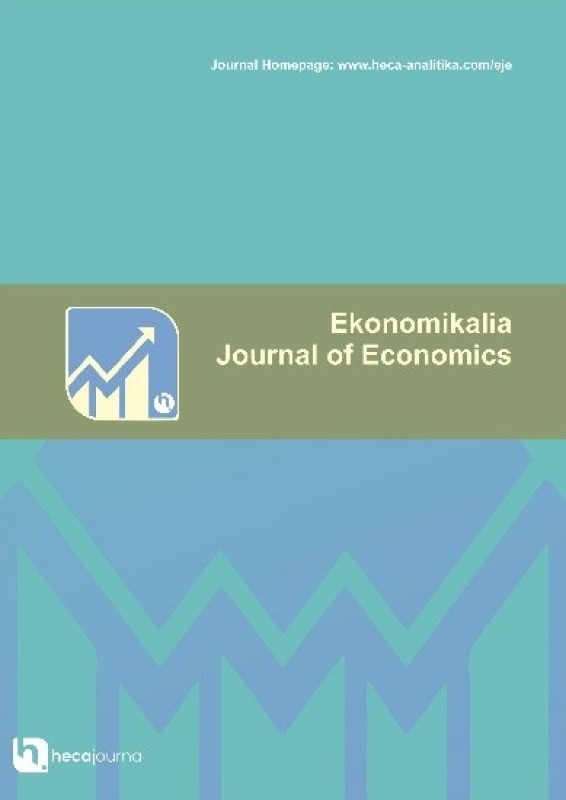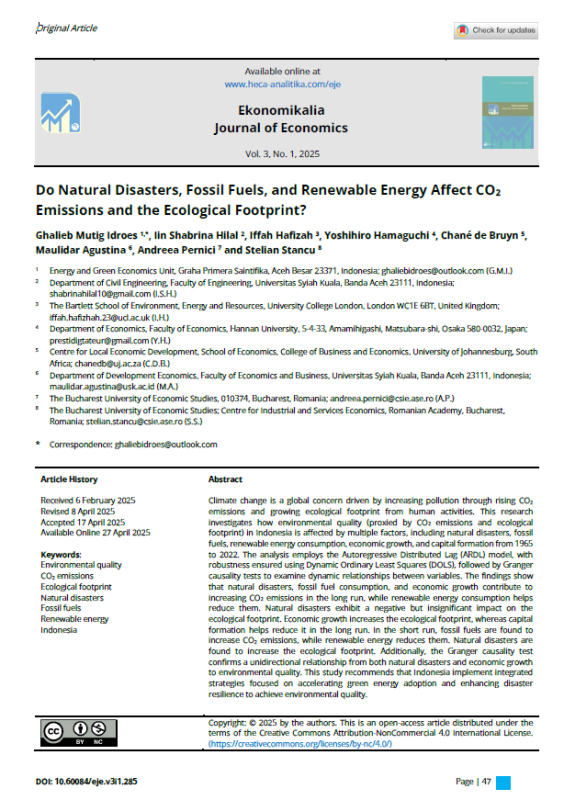インドネシア、南アフリカ、ルーマニアに所属する研究者との共同研究が、Ekonomikalia Journal of Economics (オープンアクセス誌・査読有)に掲載されました。二酸化炭素の排出量が増え続ける中、地球温暖化は以前にも増して深刻化しています。この地球温暖化は、自然災害の激甚化により、自然環境を大きく損ねていると言われています。しかし、意外な事にも、自然災害による被害は、家計の消費やエネルギー利用を減らし、結果的に、二酸化炭素の排出量を減らす効果があるとも指摘されています。だからといって、豊かな生態系が破壊されてしまえば、森林が保有する炭素吸収効果が阻害され、二酸化炭素の排出量が増えてしまうかもしれません。
急速な経済成長が進むインドネシアでは、自然災害や化石燃料への依存により、環境の質が急速に悪化しています。このインドネシアを分析対象として、本研究では、二酸化炭素排出量とエコロジカルフットプリントで近似される環境の質が、自然災害、化石燃料、再生可能エネルギー消費、経済成長、資本形成から、どのような影響を受けているのかを実証的に分析しています。
分析の結果、自然災害、化石燃料の消費、経済成長が、長期的には二酸化炭素排出量を増やしている一方で、再生可能エネルギー消費が、二酸化炭素排出量を減らしています。自然災害は、生態系に対する負荷を強めてしまいますが、今回の分析では、統計的に有意ではありませんでした。これらの結果を踏まえて、グリーンエネルギーの普及を通じて、災害に対するレジリエンスを強化する統合的戦略の実施をインドネシア政府に推奨しています。
地球温暖化問題は、今や地球沸騰化時代と呼ばれるまでに悪化しています。このグローバルな問題を解決する為には、日本だけが努力するだけでなく、世界各国と協力して問題の解決にあたる必要があります。そうしたことから、この問題を、世界中の研究者、とりわけアジア圏の研究者と分析することには、大きな意義があることでしょう。今後も、こうした環境問題に対する共同研究を世界中の研究者と実行し、その成果を日々の教育活動に還元していきます。
急速な経済成長が進むインドネシアでは、自然災害や化石燃料への依存により、環境の質が急速に悪化しています。このインドネシアを分析対象として、本研究では、二酸化炭素排出量とエコロジカルフットプリントで近似される環境の質が、自然災害、化石燃料、再生可能エネルギー消費、経済成長、資本形成から、どのような影響を受けているのかを実証的に分析しています。
分析の結果、自然災害、化石燃料の消費、経済成長が、長期的には二酸化炭素排出量を増やしている一方で、再生可能エネルギー消費が、二酸化炭素排出量を減らしています。自然災害は、生態系に対する負荷を強めてしまいますが、今回の分析では、統計的に有意ではありませんでした。これらの結果を踏まえて、グリーンエネルギーの普及を通じて、災害に対するレジリエンスを強化する統合的戦略の実施をインドネシア政府に推奨しています。
地球温暖化問題は、今や地球沸騰化時代と呼ばれるまでに悪化しています。このグローバルな問題を解決する為には、日本だけが努力するだけでなく、世界各国と協力して問題の解決にあたる必要があります。そうしたことから、この問題を、世界中の研究者、とりわけアジア圏の研究者と分析することには、大きな意義があることでしょう。今後も、こうした環境問題に対する共同研究を世界中の研究者と実行し、その成果を日々の教育活動に還元していきます。
A joint research study conducted with researchers from Indonesia, South Africa, and Romania has been published in the Ekonomikalia Journal of Economics (open access, peer-reviewed journal). As carbon dioxide emissions continue to rise, global warming is becoming increasingly severe. This global warming is said to be causing significant damage to the natural environment through the intensification of natural disasters. However, surprisingly, it has also been pointed out that damage caused by natural disasters can reduce household consumption and energy use, thereby reducing carbon dioxide emissions. If rich ecosystems are destroyed, the carbon absorption capacity of forests may be impaired, leading to an increase in carbon dioxide emissions.
In Indonesia, where rapid economic growth is progressing, the quality of the environment is deteriorating rapidly due to natural disasters and dependence on fossil fuels. Taking Indonesia as the subject of analysis, this study empirically analyses how the quality of the environment, approximated by carbon dioxide emissions and ecological footprints, is affected by natural disasters, fossil fuel consumption, renewable energy consumption, economic growth, and capital formation.
The analysis revealed that natural disasters, fossil fuel consumption, and economic growth increase carbon dioxide emissions in the long term, while renewable energy consumption reduces them. Although natural disasters intensify the burden on ecosystems, this analysis did not find a statistically significant effect. Based on these results, we recommend that the Indonesian government implement an integrated strategy to strengthen resilience against disasters through the promotion of green energy.
Global warming has worsened to the point where it is now referred to as the ‘global boiling era.’ To solve this global problem, it is necessary not only for Japan to make efforts but also for countries around the world to cooperate in addressing the issue. In this context, there is significant value in analysing this problem with researchers worldwide, particularly those in Asia. Going forward, we will continue to conduct joint research on environmental issues with researchers worldwide and incorporate the results into our daily educational activities.
Reference:
Idroes, G. M., Hilal, I. S., Hafizah, I., Hamaguchi, Y., Bruyn, C. de, Agustina, M., Pernici, A., & Stancu, S. (2025). Do Natural Disasters, Fossil Fuels, and Renewable Energy Affect CO2 Emissions and the Ecological Footprint?. Ekonomikalia Journal of Economics, 3(1), 47–63. https://doi.org/10.60084/eje.v3i1.285
In Indonesia, where rapid economic growth is progressing, the quality of the environment is deteriorating rapidly due to natural disasters and dependence on fossil fuels. Taking Indonesia as the subject of analysis, this study empirically analyses how the quality of the environment, approximated by carbon dioxide emissions and ecological footprints, is affected by natural disasters, fossil fuel consumption, renewable energy consumption, economic growth, and capital formation.
The analysis revealed that natural disasters, fossil fuel consumption, and economic growth increase carbon dioxide emissions in the long term, while renewable energy consumption reduces them. Although natural disasters intensify the burden on ecosystems, this analysis did not find a statistically significant effect. Based on these results, we recommend that the Indonesian government implement an integrated strategy to strengthen resilience against disasters through the promotion of green energy.
Global warming has worsened to the point where it is now referred to as the ‘global boiling era.’ To solve this global problem, it is necessary not only for Japan to make efforts but also for countries around the world to cooperate in addressing the issue. In this context, there is significant value in analysing this problem with researchers worldwide, particularly those in Asia. Going forward, we will continue to conduct joint research on environmental issues with researchers worldwide and incorporate the results into our daily educational activities.
Reference:
Idroes, G. M., Hilal, I. S., Hafizah, I., Hamaguchi, Y., Bruyn, C. de, Agustina, M., Pernici, A., & Stancu, S. (2025). Do Natural Disasters, Fossil Fuels, and Renewable Energy Affect CO2 Emissions and the Ecological Footprint?. Ekonomikalia Journal of Economics, 3(1), 47–63. https://doi.org/10.60084/eje.v3i1.285








